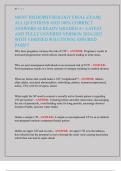1|Page
NR507 PATHOPHYSIOLOGY FINAL EXAM||
ALL QUESTIONS AND 100% CORRECT
ANSWERS ALREADY GRADED A+ LATEST
AND FULLY COVERED VERSION 2024-2025
WITH VERIFIED SOLUTIONS|| ASSURED
PASS!!!
Why does pregnancy increase the risk of UTI? - ANSWER: Pregnancy results in
increased progesterone which relaxes smooth muscle leading to urine stasis.
Why are post-menopausal individuals at an increased risk of UTI? - ANSWER:
Post-menopause results in a lower amount of estrogen resulting in urethral dryness.
What are factors that would make a UTI "complicated"? - ANSWER: infants,
older adults, structural abnormalities, indwelling catheter, immunocompromised,
males, UTIs with fever/sepsis, stones
What might the NP need to counsel a sexually active female patient n regarding
UTI prevention? - ANSWER: Urinating before and after intercourse, discouraging
the use of spermicide, avoid holding urine for long periods, encourage showers
instead of baths, increase water intake
Define a simple UTI - ANSWER: A simple or uncomplicated UTI is in an afebrile
non-pregnant immune-competent female patient
Define an upper UTI and its risks - ANSWER: An upper UTI is in the kidneys,
this infection has the potential to move through the renal veins causing bacteremia
which then can lead to septic shock
,2|Page
Define cystitis - ANSWER: Lower UTI with bladder infection
Define pyelonephritis and S/S - ANSWER: infection of the kidney, S/S: vomiting,
flank pain, fever
What is the most common bacteria that causes UTI? - ANSWER: Escherichia coli,
this usually comes from fecal matter
What abnormal lab values in a urinalysis would indicate UTI? (5) - ANSWER:
increased RBCs, increased WBCs, presence of bacteria, presence of large crystals,
presence of casts
What is the main difference in UA results between a uncomplicated and a
complicated UTI? - ANSWER: In an uncomplicated UTI, the WBC count will be
>5,000. In a complicated UTI, the WBC count will be >100,000. Casts will only be
present in complicated UTIs.
What does the presence of nitrates in a UA indicate? - ANSWER: Positive nitrates
indicates gram negative bacteria
True or false, BPH causes cancerous growth. - ANSWER: False.
What is the effect of BPH on the bladder? - ANSWER: BPH can lead to bladder
hypertrophy d/t increased bladder contractions as the individual will strain to
urinate d/t constriction of the prostatic urethra.
What are the irritative symptoms of BPH? - ANSWER: Irritative symptoms are
related to the storage of urine. Symptoms include: nocturia, frequency, urgency,
bladder pain, urge incontinence
, 3|Page
What are the obstructive symptoms of BPH? - ANSWER: Obstructive symptoms
are related to voiding. Symptoms include: hesitancy, straining, weak flow,
dribbling, retention, and overflow incontinence
What is the cause of BPH? - ANSWER: Normal cells response to
dihydrotestosterone which causes the cells to proliferate and live longer.
Dihydrotestosterone is a hormone that stimulates the development of male
characteristics (an androgen). It is made through conversion of the more commonly
known androgen, testosterone.
What does BPH stand for? - ANSWER: benign prostatic hypertrophy or
hyperplasia
What is the pharmacotherapy for BPH? - ANSWER: 5-alpha-reductase inhibitors
(Finasteride, Proscar) inhibit testosterone from becoming dihydrotestosterone and
therefore shrink the prostate.
What is the function of prostate specific antigen? - ANSWER: PSA is an enzyme
that liquifies semen post-ejaculation to allow the sperm to "swim" aka dissolution
of the seminal fluid coagulum
True or false, BPH increases risk of UTI. - ANSWER: True, increases risk of UTI
d/t stagnation of urine.
What is the largest zone of the prostate? - ANSWER: Peripheral zone
Which zone of the prostate has the highest risk for development of BPH? -
ANSWER: The transitional zone




